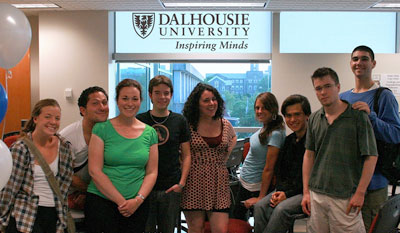 |
| Instructor Bianna Kuksin (in green) withstudents in last year's Hebrew class. |
If the struggle to read Hebrew for your Bar Mitzvah drove youstraight into the pages of a Philip Roth novel, maybe you’llfind modern Hebrew more forgiving.
“The ancient Hebrew in the Torah, even people in Israelhave difficulties understanding the language,” says BiannaKuksin, Dal’s Modern Hebrew instructor.
Don’t worry, religion won’t enter the classroom.There’s no politics, either. A broad mix of studentscomprised last year’s class, taught through the RussianStudies department. (Dalhousie also offers Introductory ClassicalHebrew (CLAS 1900), offered through the Department ofClassics.)
Many of her students traveled to Israel after the course, shesays. “They wrote me that they had a very good experience.They were able to read, to understand signs and to greetpeople.”
Introduction to Modern Hebrew (ASSC 1025X/Y.06) is an intense summercourse: seven weeks, four times a week for two-and-a-half hours aday. “My main goal in the course is to give students theknowledge of the alphabet, the ability to read, to write, to put asentence together,” says Ms. Kuksin.
She does teach about Israeli culture—like how to findthe best falafel in Tel Aviv or the ins and outs of Israeli popmusic and film. This course will complement the upcoming JewishStudies program at Dalhousie, says Yuri Leving, chair of theRussian Studies department.
Probably closest to Arabic, Hebrew was rescued from nearextinction in the 19th century. While it poses some difficultiesfor English speakers, it’s “a very basic Hebrew peoplespeak on a daily basis,” Ms. Kuksin says. It functions as thelingua franca of an immigrant-rich Israel.
Ms. Kuksin started teaching Hebrew to Ethiopians, Russians andother immigrants performing their national service in the Israeliarmy. She continued to teach Hebrew in Israel before moving toHalifax with her family a year and a half ago.
She moved here because she found the current situation in herhomeland too stressful. “I think there will be a bigimmigration from Israel to Nova Scotia,” she says hopefully.“Right now we are 40 families here. I am feeling that here wecan establish a better foundation for our family. And I am doingwhat I am passionate about. This is the most importantthing.”
She works at Pier 21 and teaches at a local synagogue onSundays. Come to think of it, maybe she can help that bat mitzvahgo a little easier, too.
Editor's note: Due to low registration,Introduction to Modern Hebrew is no longerbeing offered summer 2010.
